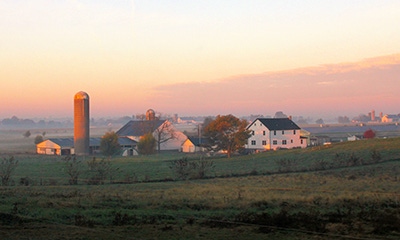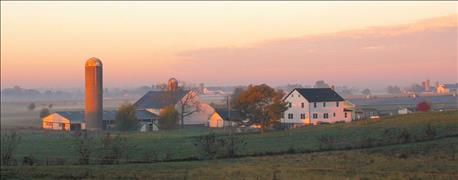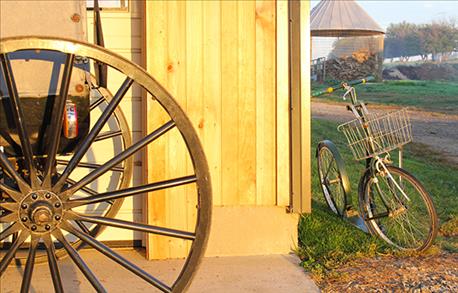
To drive past Miller’s Organic Farm near Bird-in-Hand, Pa., you’d wonder how it could be linked to a “multi-state outbreak of listeriosis”. The farm, owned by Amos Miller and family, looks like most Amish farms in Lancaster County.

TRANQUIL SETTING, TURBULENT CASE: Controversy broils over raw milk marketed from the peaceful Miller’s Organic Farm. (Photos by Gary Lake)
None the less, that’s how the Centers for Disease Control termed its recent announcement about the outbreak involving two listeriosis illnesses in elderly persons and one death in 2014. The illnesses, one each in Florida and California, were linked with the farm’s raw milk this January, after the Food and Drug Administration informed CDC that whole genome sequencing of listeria bacteria from raw chocolate milk produced by the farm in November 2015 was genetically related to samples of listeria bacteria taken from two individuals affected.
While Miller’s Organic Farm has no computer, fax or email – according to its website, it does business via the website and mail order to private club members. It also delivers products via My Healthy Food Club cooperative partners in nine states.
Why the controversy?
Prior to the CDC claim, there had been no reported illnesses associated with Miller’s Organic Farm. That’s according to Sally Fallon Morell, president of the Weston A. Price Foundation, a nutrition education non-profit based in Washington, D.C. And there have been no listeriosis cases attributed to raw milk consumption going back 40 years or more, she adds.
“This recent release from the CDC is a deliberate attempt to tarnish raw milk and present false and defamatory information,” says Morell. “This is a witch-hunt against raw milk.”

WHEELS OF LOCOMOTION: Aside of trucks coming and going, these are the prime movers on Miller’s farm.
A statement by a family member of the deceased woman supports that charge: “My family member was diagnosed with and died of cancer after a week of chemo,” says Peggy Stevenson, family member and caregiver of the deceased prior to her death. While she acknowledged that the woman had drank raw milk from Miller’s Organic Farm, “I’m outraged that the CDC is using our tragic situation to damage and try to destroy a farm we love and support.”
What’s not clear is whether the milk was shipped directly from the farm or via cooperative partners active in both states.
“This is a weak attempt to shut down people’s choices,” adds Pete Kennedy, president of the Farm-to-consumer Legal Defense Fund. “It shows this bureaucracy is getting more desperate in trying to stop the growing demand for raw milk.”
As reported above and in a Food Safety News story, CDC scientists matched up the listeria genomes via database analysis. As Matthew Wise, CDC’s Outbreak Response Team lead put it: “When we say ‘likely source’ it means we have two different lines of evidence showing the same result. It means we’re very confident we know the source. ‘Closely related genetically’ for us means in the realm of identical twins.”
For more CDC info on this case, click on raw milk listeria outbreaks.
Catch the Food Safety News article 2-million base pairs later, CDC stands by dna evidence. Be sure to read the comments that follow.
A Pennsylvania Ag Department spokesperson offered this explanation of why Miller’s Organic Farm isn’t licensed or inspected by the department: The farm “does not operate a retail store in Pennsylvania, but is alleged to do business via mail order to a ‘membership club’.
“Sales occurring outside of Pennsylvania are not under the jurisdiction of the Pennsylvania Department of Agriculture. A sale occurs under law where the delivery takes place. In this instance, the Food and Drug Administration (FDA) is the party to enforce federal laws prohibiting the sale of raw milk across state lines. All aspects of the business and whether any Pennsylvania laws are being violated remain under investigation.”
About the Author(s)
You May Also Like




